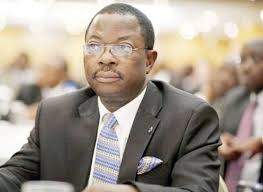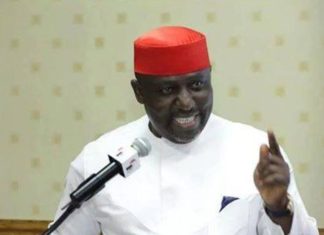Former Managing Director of the defunct Intercontinental Bank, Erastus Akingbola, has asked the Supreme Court to upturn the judgment of the Appeal Court which ordered his retrial over alleged N5 billion corruption levelled against him by the Economic and Financial Crimes Commission (EFCC).
The Appeal Court on February 20 overturned the judgment of the High Court which dismissed the 26-count charge against him.
The unanimous decision was based on the appeal by the EFCC challenging the judgment delivered on April 2, 2012 by Justice Charles Archibong (now retired) of the Federal High Court, Lagos.
Archibong had dismissed the charge filed by the EFCC against Akingbola for want of diligent prosecution.
The EFCC through its counsel, Khrushchev Ekwueme, asked the Appeal Court in Lagos to set aside the judgment and hold that there was enough prima facie evidence to warrant the prosecution of Akingbola.
The lead judgment of the Appeal Court, delivered by Justice Amina Augie, nullified the judgment of the High Court and ordered a retrial, insisting that a judge must have a sound basis for any judgment, as judgment cannot be made in a vacuum.
Augie held that any bystander who watched the proceedings that necessitated the appeal could not possibly conclude that there was a fair hearing, as the trial judge overreacted in his state of anger and fell short of the composure, decorum, and standard expected of a judge in the discharge of his duties.
She said the court must decide on the merit of every application before it, noting that it could not be said that the prosecution was not ready to move its application for a stay of proceedings on the day.
The Appeal Court ordered that the charge be remitted to the Chief Judge of the Federal High Court, Ibrahim Auta, for re-assignment to another judge for retrial on merit and for accelerated hearing.
Akingbola in his notice of appeal before the Supreme Court filed by his counsel, Felix Fagbohungbe, asked for the setting aside of the judgment of the Appeal Court.
He anchored his appeal on two grounds:
• “The justices of the Court of Appeal erred in law when they held that the trial judge at the lower court dismissed the charge and discharged Akingbola without stating the grounds on which the decision was based.
• “The lower court erred in law when it held that any bystander, who watched what transpired that day in court, would certainly come away with the impression that the appellant (EFCC) did not get a fair hearing.”
Akingbola contended that the principle of fair hearing is applicable to all parties before the court, and that at all relevant times, the EFCC was given the opportunity to proceed with his arraignment and trial but elected not to do so.
He argued that the trial judge had inherent jurisdiction to prevent an abuse of the court process, unnecessary oppression, and violation of Akingbola’s right to fair hearing.
He stressed that “the learned trial judge was at liberty to invoke the court’s inherent powers to prevent an abuse of the judicial process and dismiss the charge before the court suo motu even without any application by the appellant.”
He submitted that the trial judge was at liberty to regard the conduct of the counsel to the EFCC in relation to the intentional abuse of the judicial process as reprehensible and condemnable.














